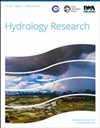气候变化下大范围洪水事件的空间相干统计模拟
IF 2.4
4区 环境科学与生态学
Q2 Environmental Science
引用次数: 0
摘要
即使使用UKCP18 12公里区域气候预测等模拟数据,也很难模拟罕见的大范围水文事件。为了生成用于巨灾建模的更大事件集,本文强调了两种统计方法,并使用基于网格的水文模型和UKCP18区域预测将其应用于广泛的gb生成的洪水事件。在全国范围内应用了经验Copula方法,在两个时间片(1980-2010年和2050-2080年)中生成了超过600,000个事件。这与模型生成的事件进行了比较,并在时间片和集合成员之间显示出良好的匹配,尽管缺乏描述最不罕见事件的能力。经验联结也被比较为条件超越模型的实现。这个模型的计算量更大,因此仅限于英格兰西北部但可以通过选择边际分布进行更精细的调整。在分析了11,000多个事件后,它也与Empirical Copula和模型生成的事件很好地匹配,但对最小事件的代表性不足。这两种方法都需要广泛的数据集,但都显示出合理的效果。对于简单的统计,经验Copula显示了在大区域或精细空间分辨率下探索空间结构的强大工具的潜力。本文章由计算机程序翻译,如有差异,请以英文原文为准。
Spatially coherent statistical simulation of widespread flooding events under climate change
Simulating rare widespread hydrological events can be difficult even with the use of modelled data such as the UKCP18 12 km regional climate projections. To generate larger event sets for application in catastrophe modelling, two statistical approaches are highlighted and applied to widespread GB-generated flooding events using a grid-based hydrological model and UKCP18 regional projections. An Empirical Copula method was applied on a national scale, generating over 600,000 events across two time-slices (1980–2010 and 2050–2080). This was compared to model-generated events and showed good matching across time-slices and ensemble members, although lacked some ability to describe the least-rare events. The Empirical Copula was also compared to an implementation of a conditional exceedance model. This model was much more computationally intensive so was restricted to Northwest England but offered the ability to be tuned more finely through choices of marginal distributions. Analysing over 11,000 events, it also matched well with the Empirical Copula and model-generated events but under-represented the smallest events. Both approaches require a broad dataset to draw from but showed reasonable efficacy. For simple statistics, the Empirical Copula shows the potential to be a powerful tool in exploring spatial structure over large regions or at a fine spatial resolution.
求助全文
通过发布文献求助,成功后即可免费获取论文全文。
去求助
来源期刊

Hydrology Research
Environmental Science-Water Science and Technology
CiteScore
5.30
自引率
7.40%
发文量
70
审稿时长
17 weeks
期刊介绍:
Hydrology Research provides international coverage on all aspects of hydrology in its widest sense, and welcomes the submission of papers from across the subject. While emphasis is placed on studies of the hydrological cycle, the Journal also covers the physics and chemistry of water. Hydrology Research is intended to be a link between basic hydrological research and the practical application of scientific results within the broad field of water management.
 求助内容:
求助内容: 应助结果提醒方式:
应助结果提醒方式:


